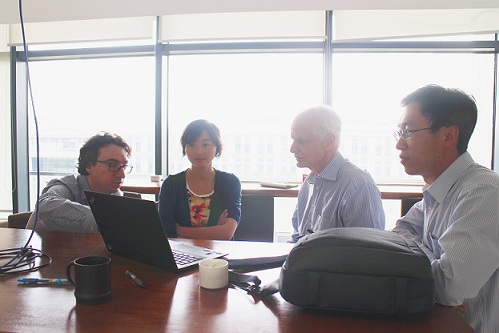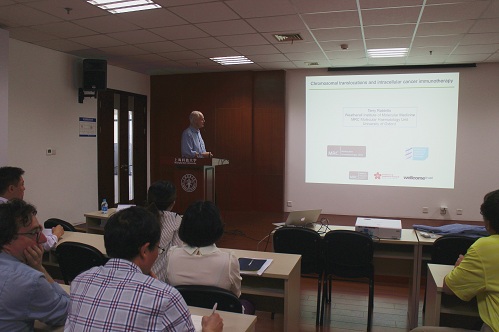Author:SIAIS
Date:27 May 2015
On May 15, 2015, invited by the ShanghaiTech Life Science Seminar Series, Professor Terence Rabbitts from the Weatherall Institute of Molecular Medicine of Oxford University, delivered a lecture titled Chromosomal translocations and intracellular cancer immunotherapy.
Chromosomal translocations occur as cancer-specific abnormalities in all types of human cancer ranging from leukaemias/lymphomas, sarcomas and epithelial tumours. The oncogenic proteins produced from translocation breakpoints work inside the cell, but are rarely enzymes, and as such are difficult therapeutic targets. Professor Terence Rabbitts’ introduced his team’swork in studying a commonly occurring chromosomal translocation in T cell acute leukaemia activating the LMO2 gene to develop methods for intracellular immunotherapy targeting. The team has developed a designer single variable region domain antibody fragment that can fold correctly inside cells and methods for selection of antibody fragments (termed macrodrugs) that interact with target proteins and impede their involvement in the formation of protein complexes. To implement their use in cells, the team has developed an in silico filtering procedure analysing whole transcriptomes from cancers, to identify cell surface proteins that can act as gate-way molecules for delivery of macrodrug cargos (intracellular antibodies or vectors for their expression) from the cancer cell surface to the inside of cells to implement the intracellular immunotherapy.
Biography of Professor Terence Rabbitts
Dr. Rabbitts received his B.S. degree from University of East Anglia and then Ph.D degree from National Institute for Medical Research. He then became a research fellow in the Department of Genetics, University of Edinburgh. In 1973, he joined Medical Research Council Laboratory of Molecular Biology at Cambridge. In 1988, he became the joint head of LMB Division of Protein and Nucleic Acid Chemistry and later the Head of LMB Subdivison of Biology. He later moved to Leeds Institute for Molecular Medicine as the Director. Now he is a Professor of Molecular Biology at the University of Oxford. His group is located at the Weatherall Institute of Molecular Medicine.
Dr. Rabbitts have numerous high-impact publications that have been cited for hundreds of times. He has received many prestigious awards and has been elected Member of European Molecular Biology Organization, Fellow of the Royal Society, Fellow of Academy of Medical Sciences London and many others. He also has amazing off-campus activities and has been on the scientific advisory board of many companies.






